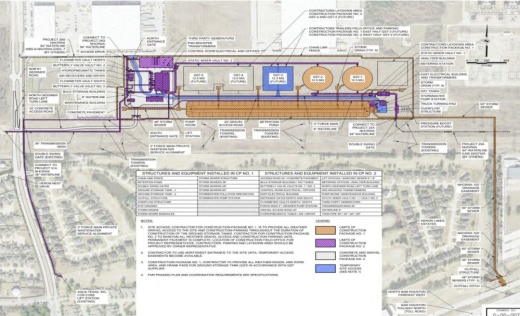This project is expected to allow for additional water intake to reach utility districts further west. Rendl said this will expand the amount taken from the water treatment plant on Lake Houston from 80 million to more than 400 million gallons a day.
The Gessner Road property will house two 10 million-gallon storage tanks initially but will have space for five or six tanks for future needs.
“It will have the ability to take the water from the purification plant on Lake Houston—it will be testing it constantly, adding chloramines as necessary and then pushing it out to the utility districts that will be part of the system as we go forward,” Rendl said.
This effort is part of the water authority’s long-term plan to convert local utility districts from the use of groundwater to surface water—a process that has been ongoing since before 2010 as underground water sources begin to dry up and state government set out to reduce subsidence in the region.
Officials with the NHCRWA said Cypress Creek Utility District, Emerald Forest Utility District, Harris County MUD No. 230, Mills Road MUD and Northwest Harris County MUD No. 32 are expected to make the conversion by the end of May. These districts serve neighborhoods south of Hwy. 249 near Mills Road and Cypresswood Drive. A list of additional utility districts expected to convert to surface water by the end of 2025 can be found here.
Pump station construction will be ongoing until about mid-2024. The pump station and additional piping to reach another 40-50 utility districts is about a $650 million project, according to Rendl. Funding will come from the State Water Implementation Fund for Texas as well as groundwater pumpage and surface water fees, which are currently set at $4.60 per 1,000 gallons and $5.05 per 1,000 gallons, respectively.
“We will raise that price to be able to cover the service debt, but we did not have to raise the price this year, and we don’t anticipate having to do it again yet. It will go up as we need the funds,” Rendl said.





